The HP S700 And S700 Pro SSD Review
by Billy Tallis on September 7, 2017 9:00 AM ESTAnandTech Storage Bench - The Destroyer
The Destroyer is an extremely long test replicating the access patterns of very IO-intensive desktop usage. A detailed breakdown can be found in this article. Like real-world usage, the drives do get the occasional break that allows for some background garbage collection and flushing caches, but those idle times are limited to 25ms so that it doesn't take all week to run the test. These AnandTech Storage Bench (ATSB) tests do not involve running the actual applications that generated the workloads, so the scores are relatively insensitive to changes in CPU performance and RAM from our new testbed, but the jump to a newer version of Windows and the newer storage drivers can have an impact.
We quantify performance on this test by reporting the drive's average data throughput, the average latency of the I/O operations, and the total energy used by the drive over the course of the test.
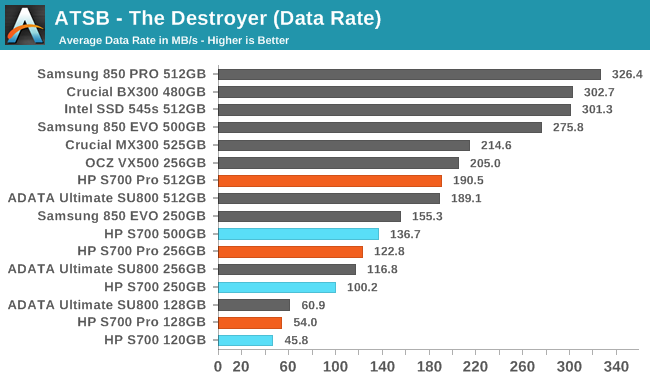
The average data rates of the S700 Pros on The Destroyer are slightly faster than the ATATA SU800 except at the 128GB capacity. The S700's disadvantage relative to the S700 Pro is more pronounced at higher capacities, growing from a 15% gap at the 120GB/128GB capacity range to almost 30% between the 500GB S700 and 512GB S700 Pro.
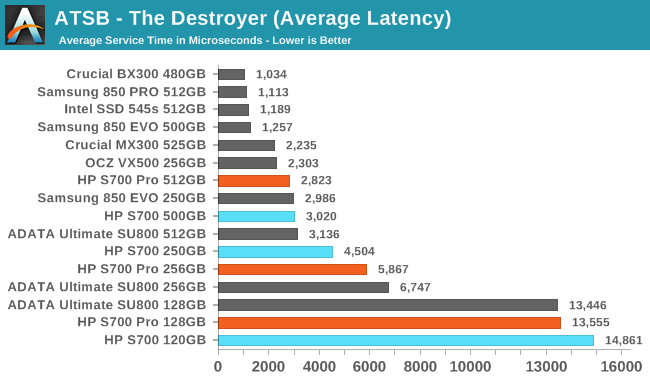
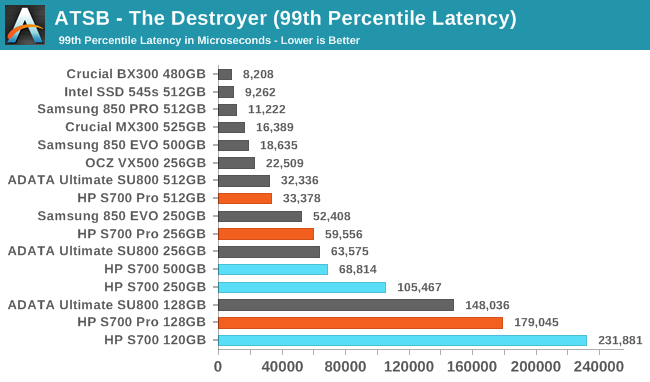
The 250GB S700 surprises with a lower average latency than the 256GB S700 Pro, and at this capacity point and the 500GB/512GB capacity point both HP drives score better than the ADATA SU800. The 99th percentile latency scores aren't as good, with the S700 coming in last place at every capacity point and the S700 Pro only beating the ADATA SU800 in the 256GB capacity.
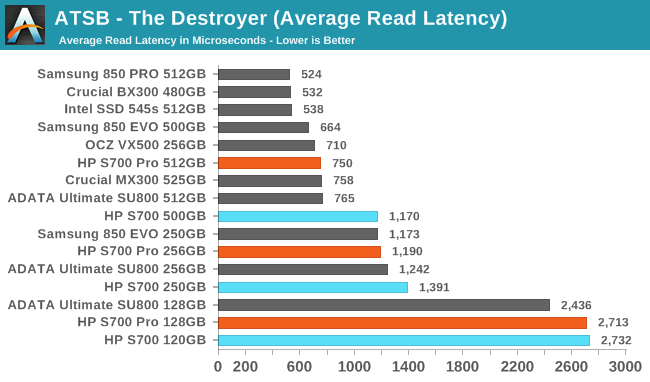
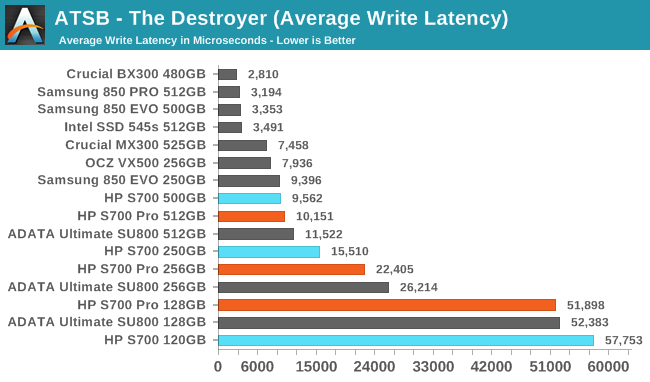
The average read latencies of the HP S700s are almost tied with the S700 Pro at the smallest capacity configuration, but the larger drives show a substantial gap. Average write latencies for the S700 are actually better than the S700 Pro and the ADATA SU800 except for the 120GB capacity.
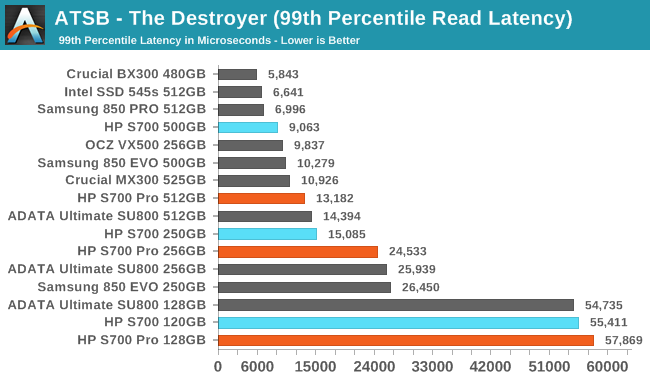
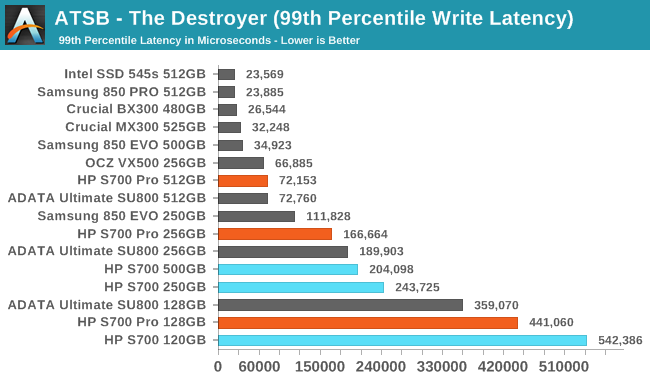
The HP S700 does not have a particular problem with garbage collection getting in the way of read operations as its 99th percentile read latency scores are better than the S700 Pro's scores and are reasonable even when compared to mid-range SATA drives and even drives using MLC. The 99th percentile write latency scores are poor for both the S700 and S700 Pro, but the ADATA SU800 is no better except for its 128GB capacity.
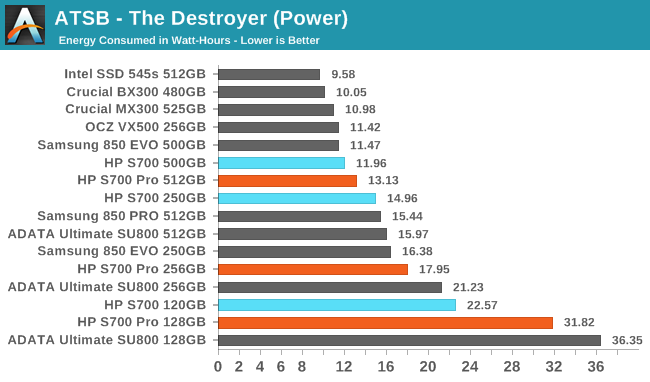
The DRAMless HP S700 is more energy-efficient on The Destroyer than the faster HP S700 Pro, and both beat the ADATA SU800. All of these drives obey the usual pattern of higher capacities offering better efficiency under load thanks to their higher performance being more than enough to offset higher overall power levels.










54 Comments
View All Comments
sonny73n - Saturday, September 9, 2017 - link
I understand that but where it'll lead us to? Most of things cost much more in the US compared to the same in China - from gasoline to food. A Chinese can cover his living expenses with just $1000/month while it takes at least twice that much for an American. Keep on rising the minimum wage will not solve the problem because we will be left with nothing to produce. Something's really messed up here.demMind - Monday, September 11, 2017 - link
sonny.. US Companies can afford to pay wages in the US. They just don't want to because executives love their year-over-year bonuses and dividends to grow. So no, prices haven't gone up because of cost of labor, they've gone up because each of us wants as much as we can get for as little extra effort as possible.Fujikoma - Thursday, September 14, 2017 - link
The price wouldn't be that much more. That extra labor savings is balanced by less efficient use of labor, material waste, shipping costs, increased counterfeit products, higher CEO pay and stock payouts if they exist (Apple is a good one for this). When companies moved to China, they did not lower their prices from cheaper labor. They lined their pockets with the extra cash. I worked for over a decade with a major electronics manufacturer invested heavily in China. Nothing but a headache for such a slim margin. That was with a 50X price margin on one of their highest volume products compared to a 12X price margin with the Mexican produced product (selling price relative to claimed materials + labor + storage + packaging + advertising + everything else involved). The higher margin is offset by shipping, defective/poorly made product, counterfeit product and material waste from poor manufacturing setup.As to the cheaper labor, that's because the U.S. allows product made from next to slave labor AND product made in environmentally damaging conditions to be imported into this country. Why do you think China has a pollution problem (aside from coal)... less regulation compared to Europe, Canada, Japan and the U.S.
Samus - Tuesday, December 26, 2017 - link
Sonny, you realize Lenovo lost the crown 2 years ago? They held the #1 spot for 14 quarters. HP has held the #1 spot for 39 quarters since 2006 when they took it from Dell.Nobody is hurt...except the Fortune 500 companies that blindly bought into Lenovo based on price, only to have their IT dept advocate for change almost immediately. Which aligns perfectly with the 3 year corporate product cycle and the amount of time Lenovo held the #1 sales edge in North America.
I'm an IT director, I know first hand the outcry my community had over Lenovo, and not just in relation to superfish.
petar_b - Tuesday, September 12, 2017 - link
I don't stand any of these big players HP, Lenovo.... It's all rip off, Lenovo's licensing is too complicated (can't activate features you paid for on hardware that they consider obsolete) and then on HP side plenty of similar crap. You almost feel bad for asking for something you own/deserve/paid.... I love SunMicro, chenbro, clean LSI or Adaptec works with everything. What HP SSD, that one will be backed by warranty only if attached to their mobo, or whatever other stupidity...Flunk - Thursday, September 7, 2017 - link
Marketing terms are always meaningless without context. You always need to read the specs behind the glossy advertising to know what you're buying. I don't see that changing any time soon.MajGenRelativity - Thursday, September 7, 2017 - link
AgreedyankeeDDL - Thursday, September 7, 2017 - link
I'm shocked by the price. Dramless, with those specs, should be $70, top, for the 240GB.Why in the world would I spend no less than $116, when the EVO sells for $90?!?!?!
Glock24 - Thursday, September 7, 2017 - link
Just what I was thinking. Pricing on these are ridiculous. They have a bit more storage size, but so does the Crucial MX300 and it's also way cheaper and faster!Samus - Thursday, September 7, 2017 - link
The MX300 is pretty much the only economy drive to consider outside of an 850 EVO IMHO. Even if these sell for half the retail price, they aren't worth it. You can just pickup an old M500 on eBay (or even an OEM Intel 520/530) for half these prices and have similar performance.